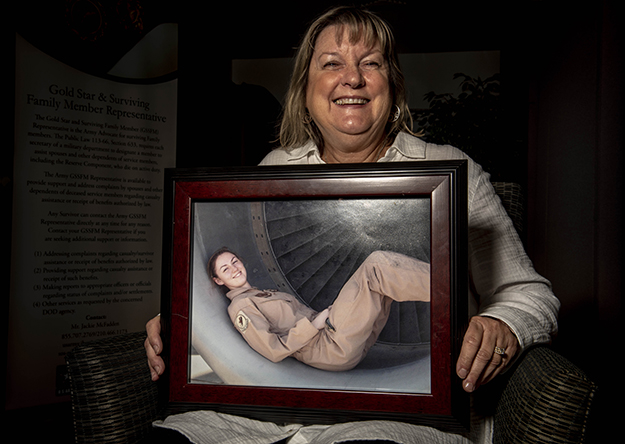She sat in the lounge area of the Survivor Outreach Services (SOS) at Joint Base Lewis-McChord. The woman had a smile on her face and extended a warm handshake. After introductions, she pulled out a portrait in a dark, wooden frame, almost the size of her bag. It was of a young lady with a smile on her face, sitting comfortably on the engine of a KC-135 Stratotanker.
"Danielle was giving," said Jane Hughes, a military spouse and mother. "I remember when she got her driver's license, she saw homeless people on the corners with their signs. She wanted to give them all money, and I said, ‘Oh, no, no, no, no. We can't do that.' So, she made bags. She would put hand warmers, snack bars, water and whatever she could find. She drove around and gave them to those in need."
As she was asked more personal questions, Hughes answered with poise. With a slight shift in her tone, Hughes continued her story.
"She actually called me that day, and told me that she loved me," she said. "Danielle was chatting a little bit, and I noticed she seemed very upset. She switched career fields because she can be on the same deployment cycle as her husband to try to save her marriage. I tried to get her to just come home and to get transferred to McChord. I said, ‘Well, did you talk to your command about trying to change locations?' And she said, ‘They said yes.' And I said, ‘Okay, well, let's talk tomorrow.'
That was the last time I talked to her."
A little after midnight on Sept.13, 2010, Hughes got a call from her daughter's husband asking if anybody has stopped by. After Hughes said no, he said, "Danielle killed herself."
Hughes lost her daughter, U.S. Air Force Staff Sgt. Danielle Crone, a former boom operator and optometry technician with the 931st Air Refueling Group in McConnell Air Force Base, Kansas.
Hughes recalled being extremely grateful for the grace and support Danielle's command has given them after her daughter died. As a military wife and a USO volunteer since 2007, she found comfort in the supportive community surrounding her at the time of her loss.
"I had the USO's support," she recalled. "I also worked at McChord, so I was around people a lot, and that helped. There was a retired Sergeant Major who kept saying, ‘You need to contact Gold Star Mothers. You need to talk to (Tragedy Assistance Program for Survivors).' I didn't want to do it. I felt, at that time, suicide wasn't an accepted type of death."
Many military survivor assistance groups and programs have storied histories. The term Gold Star gained recognition in World War I. Families displayed small banners with a blue star for every immediate family member serving in the armed forces. If their service member died in service, the family replaced the blue star with a gold star, letting the community know that their service member died or was killed while serving their country.
After attending an event with Race for a Soldier, she finally participated in TAPS and started getting involved with Gold Star Mothers and SOS. She joined their distribution lists, and as years went by, she felt more comfortable thanks to the members that made her feel accepted and included in their events and organizations.
"I became more involved and was able to find people," she said. "It's helped me in my healing process for multiple reasons. One is you have other people that understand. Peer-to-peer interaction is so important. The more you're around others who can freely speak about losing their loved ones, the easier it gets to speak about yours and move forward. Through sharing, you're healing."
Inspired by her own experience, she, along with a friend whose son was killed in action, helped found a new group in January of 2023: the Gold Star Families of Washington.
"We serve all family members and all types of deaths to be more inclusive," she said. "We welcome family members like me or those whose children or spouses had an accident or an illness. No matter which family member it is or how we lost them, we all lost somebody."
Today, Hughes continues to volunteer with the USO at the Seattle-Tacoma International Airport and the local Veterans of Foreign Wards chapter. She carries Danielle's banner during the veteran-related Auburn, Washington, parades. She also continues to serve other Gold Star family members through her organization, providing a network, emotional support and information to those who lost loved ones who served.
"Don't just sit at home," Hughes said. "Your loved one wouldn't want you to close yourself off from life just because they're no longer here. One of the best ways you can remember your family member is by living a life of service for them."





Read Comments